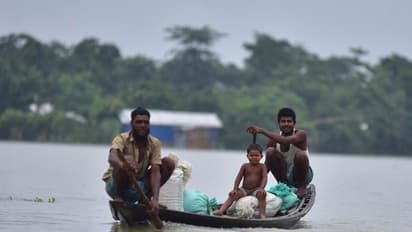Ganges, Brahmaputra and Indus will see flows reduced due to global warming: UN Chief

Synopsis
Co-hosted by Tajikistan and the Netherlands, the March 22-24 conference will result in a summary of proceedings from the UNGA President that will feed into the 2023 session of the UN High-level Political Forum on Sustainable Development.
UN Secretary General Antonio Guterres has warned that Himalayan rivers such as the Indus, the Ganges and Brahmaputra, all hugely important for India, could see reductions in their flows as glaciers and ice sheets recede over the coming decades due to global warming.
"Glaciers are critical to all life on earth. Over centuries, they carved out the landmasses we call home. Today, they cover 10 percent of our world. Glaciers are also the world's water towers," Guterres said in his remarks to an event on the International Year of Glaciers' Preservation.
Also read: UAE sights first crescent moon of Ramadan; Fasting to begin on Thursday in Gulf countries
Guterres voiced concern that human activity is driving the planet's temperature to dangerous new levels and "melting glaciers are the canary in the coalmine". Antarctica is losing an average of 150 billion tons of ice mass every year while the Greenland ice cap is melting even faster, losing 270 billion tonnes per year.
In Asia, 10 major rivers originate in the Himalaya region, supplying freshwater to 1.3 billion people living in its watershed.
"As glaciers and ice sheets continue to recede over the coming decades, major Himalayan rivers like the Indus, the Ganges and Brahmaputra will feel the impact, seeing their flows reduced," Guterres said, adding the world has already witnessed how Himalayan melts have worsened flooding in Pakistan.
Also Read: Akali Dal slams Amritpal Singh manhunt, offers legal aid to those detained by Punjab Police
He added that rising sea levels combined with saltwater intrusion will decimate large parts of these huge deltas. The event was held on the margins of the UN 2023 Water Conference, formally known as the 2023 Conference for the Midterm Comprehensive Review of Implementation of the UN Decade for Action on Water and Sanitation (2018-2028), currently underway at UN Headquarters.
Co-hosted by Tajikistan and the Netherlands, the March 22-24 conference will result in a summary of proceedings from the UNGA President that will feed into the 2023 session of the UN High-level Political Forum on Sustainable Development.
"The first UN water conference in a generation, the UN 2023 Water Conference, co-hosted by the Governments of Tajikistan and the Netherlands will be a watershed moment to mobilize Member States, the UN system and stakeholders alike to take action and bring successful solutions to a global scale," the UN has said.
Also Read: Coolie no 1... Porter find phone lost by Amitabh Bachchan's aide, hands it over to cops
Guterres cited data by the World Meteorological Organization that warned that global average sea levels have already risen faster since 1900 than over any preceding century in the last 3,000 years.
"Unless we reverse this trend, the consequences will be catastrophic. Low-lying communities and entire countries could be erased forever. We would witness mass movements of entire populations and fierce competition for water and land," he said, adding that disasters would accelerate worldwide, including floods, droughts and landslides.
Guterres called on all countries to act as one to protect people and communities alike, emphasizing the urgent need to limit global warming to 1.5 degree rise to avert the worst impacts of climate change.
"We urgently need to reduce emissions, enhance adaptation measures, and ensure climate justice. And developing countries must have the resources to adapt and build resilience against climate disaster," he said.
(With inputs from PTI)
Check the Breaking News Today and Latest News from across India and around the world. Stay updated with the latest World News and global developments from politics to economy and current affairs. Get in-depth coverage of China News, Europe News, Pakistan News, and South Asia News, along with top headlines from the UK and US. Follow expert analysis, international trends, and breaking updates from around the globe. Download the Asianet News Official App from the Android Play Store and iPhone App Store for accurate and timely news updates anytime, anywhere.